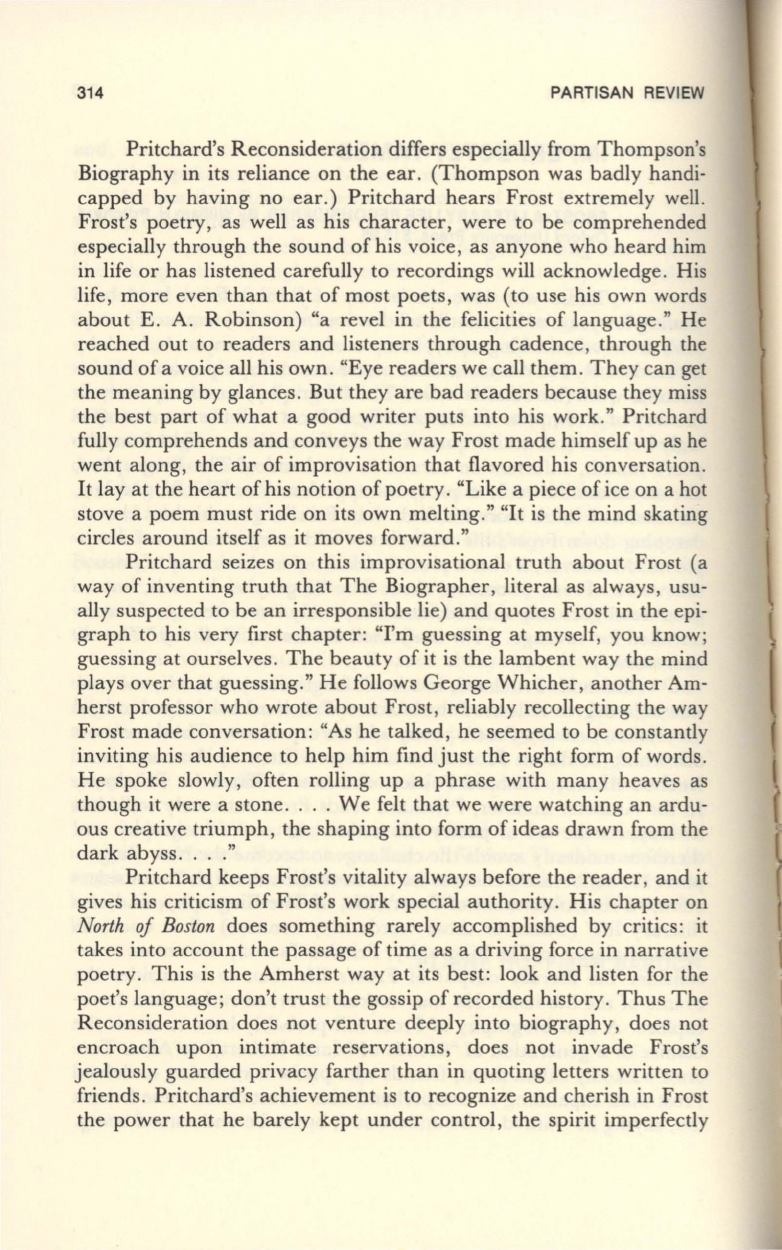
314
PARTISAN REVIEW
Pritchard's Reconsideration differs especially from Thompson's
Biography in its reliance on the ear. (Thompson was badly handi–
capped by having no ear.) Pritchard hears Frost extremely well.
Frost's poetry, as well as his character, were to be comprehended
especially through the sound of his voice, as anyone who heard him
in life or has listened carefully to recordings will acknowledge. His
life, more even than that of most poets, was (to use his own words
about E. A. Robinson) "a revel in the felicities of language." He
reached out to readers and listeners through cadence, through the
sound of a voice all his own. "Eye readers we call them. They can get
the meaning by glances. But they are bad readers because they miss
the best part of what a good writer puts into his work." Pritchard
fully comprehends and conveys the way Frost made himself up as he
went along, the air of improvisation that flavored his conversation.
It lay at the heart of his notion of poetry. "Like a piece of ice on a hot
stove a poem must ride on its own melting."
"It
is the mind skating
circles around itself as it moves forward."
\
Pritchard seizes on this improvisational truth about Frost (a
way of inventing truth that The Biographer, literal as always, usu–
ally suspected to be an irresponsible lie) and quotes Frost in the epi–
graph to his very first chapter: "I'm guessing at myself, you know;
guessing at ourselves. The beauty of it is the lambent way the mind
plays over that guessing." He follows George Whicher, another Am–
herst professor who wrote about Frost, reliably recollecting the way
Frost made conversation: "As he talked, he seemed to be constantly
inviting his audience to help him find just the right form of words.
He spoke slowly, often rolling up a phrase with many heaves as
though it were a stone.... We felt that we were watching an ardu-
ous creative triumph, the shaping into form of ideas drawn from the
dark abyss ...."
Pritchard keeps Frost's vitality always before the reader, and it
gives his criticism of Frost's work special authority. His chapter on
North of Boston
does something rarely accomplished by critics: it
takes into account the passage of time as a driving force in narrative
poetry. This is the Amherst way at its best: look and listen for the
poet's language; don't trust the gossip of recorded history. Thus The
Reconsideration does not venture deeply into biography, does not
encroach upon intimate reservations, does not invade Frost's
jealously guarded privacy farther than in quoting letters written to
friends. Pritchard's achievement is to recognize and cherish in Frost
the power that he barely kept under control, the spirit imperfectly


